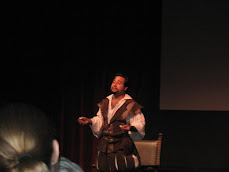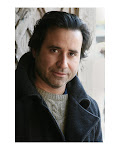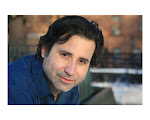By Bill Hirschman
The most stunning aspect of Zoetic Stage’s triumphant production of the dark musical Assassins is how deafening its themes resonate nearly a quarter century later in today’s polarized world of disaffected people feeling impotent unless they resort to violence to be heard above the din.
Truths that were so discomfiting that the world premiere tanked trying to find a mainstream audience during the Gulf War, now seems frighteningly prescient -– and an accepted part of the norm.
That Zoetic has chosen this uncommercial Stephen Sondheim /John Weidman opus for its first musical – and succeeded in scaling its genius – is cause for local celebration. Director Stuart Meltzer and a superb collection of actors and designers have scored, forgive me, a bull’s eye.
Assassins is a gathering at a carnival shooting gallery of eight successful and unsuccessful Presidential assassins, from the infamous John Wilkes Booth to the nearly forgotten Sam Byck who planned to fly a plane into Nixon’s White House. The book scenes and songs tell their stories from inside their mindset. All of them, especially Booth, are really there to encourage an ambivalent Lee Harvey Oswald to fulfill his destiny.
Despite a surprisingly wry and occasionally farcical tone,Assassins asks whether the root cause of these tragedies says something about the marrow of this country. The answering hypothesis is unambiguously crystalline. They result from our society propagating the specious fairy tale of the American Dream: Success is guaranteed if you apply yourself enough.
As the chorus sings with joyful entitlement, “Everybody’s got the right to be… different / Even though at times they go to extremes / Aim for what you want a lot / Everybody gets a shot / Everybody’s got the right to their dreams.”
When that promise proves hollow, some people vent their pain and disappointment in violence. They may seem a disparate group ranging from John Hinckley wanting to impress actress Jodie Foster by shooting Ronald Reagan, up to disappointed office seeker Charles Guiteau who shot James Garfield on the orders of God. But, in fact, the authors see a commonality that might strike an unsettlingly familiar chord in most people’s dissatisfaction.
The musical’s creators in no way excuse the assassins’ actions; they portray them as vain, selfish, weak, deluded and often downright insane. Yet each is someone who feels cheated of a birthright — the fantasy of America as promulgated by teachers, politicians, the media and a society at large. But the show also underscores that a chastened, saddened but essentially decent America always rebounds and prevails, or at least that’s what they wrote in 1990.
Meltzer and company have succeeded in embracing the intentionally jarring graft of broad comedy, such as pantsuited hausfrau Sara Jane Moore accidentally discharging of her pistol, and the profound emotional agony at institutionalized injustice driving the downtrodden Leon Czolgosz.
Further, the cast and band under Caryl Fantel’s music direction do justice to a challenging score that riffs on classic musical Americana, encompassing Sousa marches, a barbershop quartet and minstrel show cakewalks. But the traditional melodic strains are played off against anarchic atonal passages of angst and anger. Echoes of Sondheim’s other work are clear, such as the nimble wordplay of Into The Woods and the dissonance ofPassion.
The book, which Sondheim always credits for much of his inspiration, is by Weidman who earlier wrote the script for Pacific Overtures and later for Wise Guys/Bounce/Road Show. His scenes aren’t connective tissue between musical numbers but a fully fleshed-out play with integrated music. This gives Meltzer and his cast some dramatic and comic meat to work with.
Which brings us belatedly to the 13-member cast. In any other review, the quality of every performance would rate at least a couple of paragraphs. But with such a large assemblage, we’ll have to give some people short shrift. While these players certainly work together smoothly, ensemble isn’t quite the right term. Every one creates an independent vibrant individualized performance as evidenced by their spotlit solos. They can be terribly funny in the extremity of their delusions, then not so damn funny when they tumble over the edge of violence. Plus, several of the featured performers step into other transitory supporting roles.
If only because he has the most showy role, start with Nicholas Richberg’s Booth. The actor (Cock and All New People) exudes Booth’s mixture of self-deluded ego and patriotic altruism. A matinee idol’s charisma pours off him as he seduces Oswald from killing himself to killing Kennedy.
Then comes Chaz Mena as the hapless loser Sam Byck. He is simultaneously a hilarious and terrifying cartoon in a rumpled Santa Claus suit as he munches greasy junk food and dictates taped manifestos destined for Leonard Bernstein, Jonas Salk, Jack Anderson and Hank Aaron. Mena, a criminally underemployed actor, nails the two long diatribes in which Byck vents his barely reined fury. Mena skillfully brings a variety of tones and emotional levels to what could have just been an unrelieved spewing of bile.
Nick Duckart (Usnavi in In The Heights), as Czolgosz who shot William McKinley, embodies the outrage of the blue-collar worker at the system’s inequity. Singing in the basement of his register, Duckart brings the intensity of a barely controlled explosive. Thanks to Weidman, Duckart delivers the most relatable motivations to the piece. Duckart also believably plays a tender scene in which the troubled young man expresses his adoration to the revolutionary speaker Emma Goldman.
The certifiable Charles Guiteau as portrayed by Gabriel Zenone would be laughable if we didn’t know he was so dangerous. Zenone, who played Sylvia St. Croix in Actors Playhouse’sRuthless, makes Guiteau gleefully living in his own fantasy. He’s also the most fey Guiteau we’ve ever seen, a strange choice since he comes on to Sara Jane Moore. But Zenone is memorable for bugging out his eyes as they see doomed dreams of glory, even as he mounts the scaffold.
Chris Crawford (who had a beard last month as Richard II in Palm Beach Dramaworks’ The Lion In Winter) has a strong clear Midwestern decency that he emanates for most the show as The Balladeer, a narrator who sees the assassins for who they really are. But later, he is completely plausible as the conflicted Lee Harvey Oswald.
Just as good are Lindsey Forgey as Charles Manson’s acolyte Squeaky Fromme who tries to kill Gerald Ford; Irene Adjan as the addled but ordinary looking Moore (and Emma Goldman); Henry Gainza as Giuseppe Zangara who failed to hit Franklin Roosevelt but killed a Chicago mayor during a state visit not a mile away from the Arsht Center at Bayfront Park; Shane Tanner as the proprietor of the shooting gallery amorally arming the assassins for a buck; Clay Cartland as a woebegone John Hinckley who sings a lovely love song along with Forgey about how they would kill to prove their love; and a nod to young ensemble members Kristian Bikic, Stephanie White and Aidan Neal.
Partly responsible for everything you see, Meltzer’s staging also is dead on and he adds dozens of little fillips of his own such as a well-timed somersault whose context we won’t spoil here. While there are scene changes in blackouts, he makes the evening seem to slide by gracefully.
If you have seen the show before, Zoetic’s team brings their own fresh vision to every aspect from Michael McKeever’s set to Ron Burns’ lighting to Alberto Arroyo’s costumes. Applause is also due to the off-stage band, which includes Andrea Gilbert on woodwinds; Greg Chance, on guitar, bass and banjo; Roy Fantel on percussion and conductor Caryl Fantel playing keyboards that stand-in for another dozen instruments.
Created as a very loose repertory company, Zoetic has established itself in three seasons as a major theatrical force in the region mixing contemporary plays and acclaimed world premieres by two of its members, Michael McKeever and Christopher Demos-Brown.
But this is an unusually hefty bet being placed by Zoetic. Besides being its first musical, it has the largest cast – and therefore investment—that Zoetic has ever dared. Assassins is not one of Sondheim’s better known shows and the title is not likely to attract casual ticket buyers. The first off-Broadway production in 1990 played about three months and the Broadway production in 2004 ran only slightly longer. A production slated for 2001 closed before it opened in deference to sensitivity about 9/11. Locally, the only group to try it was Boca Raton’s Slow Burn Theatre Company in 2010 which champions challenging work.
Like some other Sondheim shows, Assassins has been tweaked over the years. Among the most prominent addition is the song, “Something Just Broke.” Meant to give the show a view from outside the minds of madmen, it depicts ordinary citizens recalling where they were when they heard of an assassination.
In the spirit of full disclosure, this critic is a Sondheim fanatic; I even value parts of Passion. I didn’t find this edition as chilling, thrilling or shocking as others I have seen, but that is likely due to my over-familiarity with the material. Others in the audience certainly felt transfixed by what Zoetic had wrought.
Any Sondheim fan understands that his work is not everyone’s cup of saltpeter. But for those who seek intelligent, thought-provoking musical theater, there are few pieces as superb as this.





















No comments:
Post a Comment